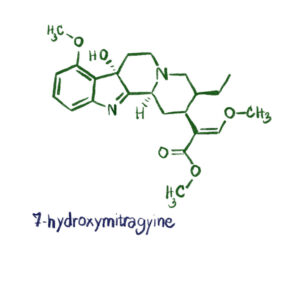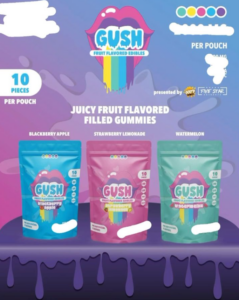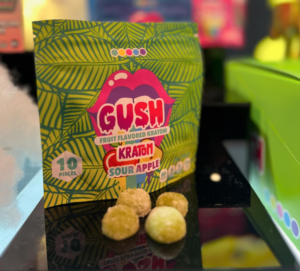THC-P (tetrahydrocannabiphorol) is one of the newest and most potent cannabinoids discovered in the cannabis plant, gaining attention for its intense effects and potential therapeutic benefits. Early research even suggests that THC-P might be more potent than THC. Some studies indicate THC-P could be up to 30x more effective at binding to CB1 receptors in the brain, which might make its effects more intense essentially. Anyways, as with other psychoactive cannabinoids, the legal status of THC-P varies by federal and state regulations, creating a complex landscape for consumers, businesses, and policymakers. This guide provides an in-depth analysis of the legal status of THC-P, from its federal classification to state-specific regulations, and the ongoing public and congressional responses.
Federal Status of THC-P
THC-P, like other cannabinoids, falls into a legal gray area at the federal level. The 2018 Farm Bill legalized hemp and hemp-derived cannabinoids, provided they contain less than 0.3% Delta 9 THC by dry weight. Since THC-P is typically derived from hemp, some argue that it is legal under federal law. However, its potency and structural similarity to Delta 9 THC raise questions about its classification under the Controlled Substances Act (CSA).
The Drug Enforcement Administration (DEA) has not yet issued a specific ruling on tetrahydrocannabiphorol, leaving its federal status ambiguous. However, given the DEA’s stance on other novel cannabinoids, there’s concern that THC-P could be classified as a Schedule I controlled substance, similar to Delta 9 THC. Until federal agencies provide clear guidance, the legality of THC-P will remain uncertain, with states making their own determinations on its legality.
Public and Congressional Response
The discovery of THC-P has sparked interest among consumers, researchers, and lawmakers. Advocates highlight its potential therapeutic uses, such as pain relief and anti-inflammatory properties, while opponents raise concerns about its potency and lack of regulation. Public interest in THC-P is growing, particularly in states where cannabis and other cannabinoids are already legal.
Congress has not yet taken significant action regarding tetrahydrocannabiphorol specifically, but broader discussions on cannabis reform could impact its legal status. The push for federal cannabis legalization, decriminalization, or rescheduling could provide a clearer framework for THC-P and other cannabinoids. However, until such legislation is passed, THC-P’s legal status will largely depend on state regulations and interpretations of existing federal law.
THC-P Legal Status by State
The legal status of tetrahydrocannabiphorol varies significantly across the United States, with some states embracing its sale and use, while others have banned or restricted it. Below is a detailed overview of THC-P regulations in each state.
Alabama
In Alabama, THC-P is currently illegal. The state has strict cannabis laws and classifies all tetrahydrocannabinols as controlled substances. Alabama does not distinguish between different types of THC, meaning THC-P is treated the same as Delta 9 THC and is prohibited.
Alaska
Alaska hasn’t yet issued specific regulations on THC-P, but it is likely considered illegal under the state’s existing cannabis laws. Alaska allows the sale and use of Delta 9 THC under its legal cannabis program, but other cannabinoids, such as THC-P, are not explicitly addressed and may be considered controlled substances.
Arizona
In Arizona, THC-P is likely illegal under the state’s current cannabis laws. Arizona has legalized Delta 9 THC for both medical and recreational use, but other cannabinoids like THC-P are not specifically addressed. Given its potency and similarity to Delta 9 THC, THC-P is likely classified as a controlled substance in Arizona.
Arkansas
Arkansas has banned THC-P, treating it as a controlled substance under state law. The state has strict regulations on cannabinoids and does not permit the sale or use of THC-P. Arkansas’ cannabis laws focus on Delta 9 THC, and other cannabinoids are not allowed for sale or consumption.
California
California allows the sale and use of THC-P under its cannabis regulations, provided it is derived from hemp and meets state safety and labeling standards. California’s cannabis market is highly regulated, and any products containing THC-P must undergo rigorous testing to ensure they meet the state’s legal requirements.
Colorado
Colorado has banned THC-P, treating it as a controlled substance under state law. The state’s cannabis regulations focus on Delta 9 THC, and other cannabinoids, including THC-P, are not allowed for sale or use. Colorado’s strict cannabis laws do not differentiate between different forms of THC, leading to the prohibition of THC-P.
Connecticut
Connecticut has not issued specific regulations on THC-P, but it is likely considered legal under the state’s cannabis laws if derived from hemp and meeting state standards. Connecticut’s cannabis regulations allow for the sale and use of cannabinoids derived from hemp, including THC-P, as long as they comply with state testing and labeling requirements.
Delaware
Delaware has banned THC-P, classifying it as a controlled substance. The state does not allow the sale, distribution, or possession of THC-P products. Delaware’s cannabis laws do not differentiate between different forms of THC, treating all tetrahydrocannabinols as controlled substances.
Florida
In Florida, THC-P is legal if derived from hemp and meeting state standards. Florida’s cannabis laws allow for the sale and use of cannabinoids derived from hemp, including THC-P, as long as they contain less than 0.3% Delta 9 THC and comply with state testing and labeling requirements.
Georgia
Georgia allows the sale and use of THC-P if it is derived from hemp and meets state standards. Georgia’s cannabis laws permit the sale of cannabinoids derived from hemp, including THC-P, provided they contain less than 0.3% Delta 9 THC and adhere to state safety and labeling standards.
Hawaii
Hawaii has not issued specific regulations on THC-P, but it is likely considered illegal under the state’s current cannabis laws. Hawaii’s cannabis laws focus on Delta 9 THC, and other cannabinoids like THC-P are not explicitly addressed, making their legality unclear and likely prohibited.
Idaho
In Idaho, THC-P is illegal. The state has some of the strictest cannabis laws in the country and does not allow the sale or possession of any cannabinoids, including THC-P. Idaho classifies all tetrahydrocannabinols as controlled substances, making THC-P prohibited.
Illinois
Illinois allows the sale and use of THC-P if it is derived from hemp and meets state standards. Illinois’ cannabis laws permit the sale of cannabinoids derived from hemp, including THC-P, as long as they comply with state testing and labeling requirements and contain less than 0.3% Delta 9 THC.
Indiana
Indiana allows the sale and use of THC-P if it is derived from hemp and meets state standards. Indiana’s cannabis laws permit the sale of cannabinoids derived from hemp, including THC-P, provided they contain less than 0.3% Delta 9 THC and adhere to state safety and labeling standards.
Iowa
In Iowa, THC-P is likely illegal under the state’s current cannabis laws. Iowa has strict regulations on cannabinoids and does not permit the sale or use of THC-P. The state classifies all tetrahydrocannabinols as controlled substances, making THC-P prohibited.
Kansas
Kansas allows the sale and use of THC-P if it is derived from hemp and meets state standards. Kansas’ cannabis laws permit the sale of cannabinoids derived from hemp, including THC-P, provided they contain less than 0.3% Delta 9 THC and comply with state testing and labeling requirements.
Kentucky
Kentucky allows the sale and use of THC-P if it is derived from hemp and meets state standards. Kentucky’s cannabis laws permit the sale of cannabinoids derived from hemp, including THC-P, provided they contain less than 0.3% Delta 9 THC and adhere to state safety and labeling standards.
Louisiana
Louisiana has banned THC-P, treating it as a controlled substance. The state does not allow the sale, distribution, or possession of THC-P products. Louisiana’s cannabis laws do not differentiate between different forms of THC, leading to the prohibition of THC-P.
Maine
Maine allows the sale and use of THC-P if it is derived from hemp and meets state standards. Maine’s cannabis laws permit the sale of cannabinoids derived from hemp, including THC-P, as long as they comply with state testing and labeling requirements and contain less than 0.3% Delta 9 THC.
Maryland
Maryland allows the sale and use of THC-P if it is derived from hemp and meets state standards. Maryland’s cannabis laws permit the sale of cannabinoids derived from hemp, including THC-P, provided they adhere to state safety and labeling requirements and contain less than 0.3% Delta 9 THC.
Massachusetts
Massachusetts allows the sale and use of THC-P if it is derived from hemp and meets state standards. Massachusetts’ cannabis laws permit the sale of cannabinoids derived from hemp, including THC-P, as long as they comply with state testing and labeling requirements and contain less than 0.3% Delta 9 THC.
Michigan
Michigan allows the sale and use of THC-P if it is derived from hemp and meets state standards. Michigan’s cannabis laws permit the sale of cannabinoids derived from hemp, including THC-P, provided they adhere to state safety and labeling requirements and contain less than 0.3% Delta 9 THC.
Minnesota
Minnesota allows the sale and use of THC-P if it is derived from hemp and meets state standards. Minnesota’s cannabis laws permit the sale of cannabinoids derived from hemp, including THC-P, as long as they comply with state testing and labeling requirements and contain less than 0.3% Delta 9 THC.
Mississippi
In Mississippi, THC-P is likely illegal under the state’s current cannabis laws. Mississippi has strict regulations on cannabinoids and does not permit the sale or use of THC-P. The state classifies all tetrahydrocannabinols as controlled substances, making THC-P prohibited.
Missouri
Missouri allows the sale and use of THC-P if it is derived from hemp and meets state standards. Missouri’s cannabis laws permit the sale of cannabinoids derived from hemp, including THC-P, provided they adhere to state safety and labeling requirements and contain less than 0.3% Delta 9 THC.
Montana
Montana has banned THC-P, treating it as a controlled substance under state law. The state’s cannabis regulations focus on Delta 9 THC, and other cannabinoids, including THC-P, are not allowed for sale or use. Montana’s strict cannabis laws do not differentiate between different forms of THC, leading to the prohibition of THC-P.
Nebraska
Nebraska allows the sale and use of THC-P if it is derived from hemp and meets state standards. Nebraska’s cannabis laws permit the sale of cannabinoids derived from hemp, including THC-P, provided they comply with state testing and labeling requirements and contain less than 0.3% Delta 9 THC.
Nevada
Nevada allows the sale and use of THC-P if it is derived from hemp and meets state standards. Nevada’s cannabis laws permit the sale of cannabinoids derived from hemp, including THC-P, as long as they comply with state testing and labeling requirements and contain less than 0.3% Delta 9 THC.
New Hampshire
New Hampshire allows the sale and use of THC-P if it is derived from hemp and meets state standards. New Hampshire’s cannabis laws permit the sale of cannabinoids derived from hemp, including THC-P, provided they comply with state testing and labeling requirements and contain less than 0.3% Delta 9 THC.
New Jersey
New Jersey allows the sale and use of THC-P if it is derived from hemp and meets state standards. New Jersey’s cannabis laws permit the sale of cannabinoids derived from hemp, including THC-P, provided they comply with state testing and labeling requirements and contain less than 0.3% Delta 9 THC.
New Mexico
New Mexico allows the sale and use of THC-P if it is derived from hemp and meets state standards. New Mexico’s cannabis laws permit the sale of cannabinoids derived from hemp, including THC-P, as long as they comply with state testing and labeling requirements and contain less than 0.3% Delta 9 THC.
New York
New York allows the sale and use of THC-P if it is derived from hemp and meets state standards. New York’s cannabis laws permit the sale of cannabinoids derived from hemp, including THC-P, provided they comply with state testing and labeling requirements and contain less than 0.3% Delta 9 THC.
North Carolina
In North Carolina, THC-P is legal if derived from hemp and meets state standards. North Carolina’s cannabis laws allow for the sale of cannabinoids derived from hemp, including THC-P, as long as they contain less than 0.3% Delta 9 THC and adhere to state safety and labeling standards.
North Dakota
North Dakota allows the sale and use of THC-P if it is derived from hemp and meets state standards. North Dakota’s cannabis laws permit the sale of cannabinoids derived from hemp, including THC-P, provided they comply with state testing and labeling requirements and contain less than 0.3% Delta 9 THC.
Ohio
Ohio allows the sale and use of THC-P if it is derived from hemp and meets state standards. Ohio’s cannabis laws permit the sale of cannabinoids derived from hemp, including THC-P, provided they adhere to state safety and labeling requirements and contain less than 0.3% Delta 9 THC.
Oklahoma
Oklahoma allows the sale and use of THC-P if it is derived from hemp and meets state standards. Oklahoma’s cannabis laws permit the sale of cannabinoids derived from hemp, including THC-P, provided they comply with state testing and labeling requirements and contain less than 0.3% Delta 9 THC.
Oregon
Oregon allows the sale and use of THC-P if it is derived from hemp and meets state standards. Oregon’s cannabis laws permit the sale of cannabinoids derived from hemp, including THC-P, provided they adhere to state safety and labeling requirements and contain less than 0.3% Delta 9 THC.
Pennsylvania
Pennsylvania allows the sale and use of THC-P if it is derived from hemp and meets state standards. Pennsylvania’s cannabis laws permit the sale of cannabinoids derived from hemp, including THC-P, provided they comply with state testing and labeling requirements and contain less than 0.3% Delta 9 THC.
Rhode Island
Rhode Island allows the sale and use of THC-P if it is derived from hemp and meets state standards. Rhode Island’s cannabis laws permit the sale of cannabinoids derived from hemp, including THC-P, provided they comply with state testing and labeling requirements and contain less than 0.3% Delta 9 THC.
South Carolina
In South Carolina, THC-P is legal if derived from hemp and meets state standards. South Carolina’s cannabis laws allow for the sale of cannabinoids derived from hemp, including THC-P, as long as they contain less than 0.3% Delta 9 THC and adhere to state safety and labeling standards.
South Dakota
In South Dakota, THC-P is likely illegal under the state’s current cannabis laws. South Dakota has strict regulations on cannabinoids and does not permit the sale or use of THC-P. The state classifies all tetrahydrocannabinols as controlled substances, making THC-P prohibited.
Tennessee
Tennessee allows the sale and use of THC-P if it is derived from hemp and meets state standards. Tennessee’s cannabis laws permit the sale of cannabinoids derived from hemp, including THC-P, provided they adhere to state safety and labeling requirements and contain less than 0.3% Delta 9 THC.
Texas
Texas allows the sale and use of THC-P if it is derived from hemp and meets state standards. Texas’ cannabis laws permit the sale of cannabinoids derived from hemp, including THC-P, provided they comply with state testing and labeling requirements and contain less than 0.3% Delta 9 THC.
Utah
Utah has banned THC-P, treating it as a controlled substance. The state does not allow the sale, distribution, or possession of THC-P products. Utah’s cannabis laws do not differentiate between different forms of THC, leading to the prohibition of THC-P.
Vermont
Vermont allows the sale and use of THC-P if it is derived from hemp and meets state standards. Vermont’s cannabis laws permit the sale of cannabinoids derived from hemp, including THC-P, provided they adhere to state safety and labeling requirements and contain less than 0.3% Delta 9 THC.
Virginia
Virginia allows the sale and use of THC-P if it is derived from hemp and meets state standards. Virginia’s cannabis laws permit the sale of cannabinoids derived from hemp, including THC-P, provided they comply with state testing and labeling requirements and contain less than 0.3% Delta 9 THC.
Washington
Washington has banned THC-P, treating it as a controlled substance under state law. The state’s cannabis regulations focus on Delta 9 THC, and other cannabinoids, including THC-P, are not allowed for sale or use. Washington’s strict cannabis laws do not differentiate between different forms of THC, leading to the prohibition of THC-P.
West Virginia
West Virginia allows the sale and use of THC-P if it is derived from hemp and meets state standards. West Virginia’s cannabis laws permit the sale of cannabinoids derived from hemp, including THC-P, provided they comply with state testing and labeling requirements and contain less than 0.3% Delta 9 THC.
Wisconsin
Wisconsin allows the sale and use of THC-P if it is derived from hemp and meets state standards. Wisconsin’s cannabis laws permit the sale of cannabinoids derived from hemp, including THC-P, provided they adhere to state safety and labeling requirements and contain less than 0.3% Delta 9 THC.
Wyoming
In Wyoming, THC-P is likely illegal under the state’s current cannabis laws. Wyoming has strict regulations on cannabinoids and does not permit the sale or use of THC-P. The state classifies all tetrahydrocannabinols as controlled substances, making THC-P prohibited.
THC-P’s Legal Status is Still in Flux, with a Patchwork of Regulations Across the USA
As a potent and newly discovered cannabinoid, THC-P has caught the attention of both consumers and regulators. While some states have embraced its sale and use under strict regulations, others have banned it outright. The lack of federal clarity adds to the complexity, making it essential for those interested in THC-P to stay informed about the latest legal developments. As the cannabis industry continues to evolve, so too will the legal landscape surrounding THC-P and other novel cannabinoids.





